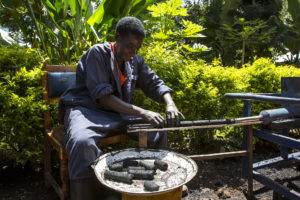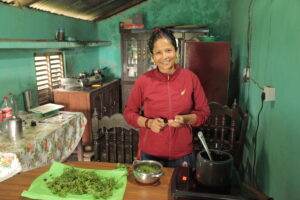Open fires and traditional stoves, used by nearly four out of five people in Africa, have dire consequences for health, the climate, and gender equality. Lack of access to clean cooking contributes to the deaths of almost 4 million people a year globally.
Clean cooking can be transformational, but despite previous commitments to achieve universal access by 2030, the world is falling short of reaching everyone. This includes the millions of people living in extreme poverty, people living in displacement settings such as camps, and people living in other hard to reach settings.
As an organisation, we are putting ingenious ideas to work so people in poverty can change their world. Our experience demonstrates that clean cooking solutions must be context appropriate to be sustainable. The right policies and finance must be in place, distribution, affordability, and cultural issues must be considered and the right partnerships must be built. Together, we need to achieve long-term, sustainable change for everyone.
To shine a light on the issue, increase much-needed funding and secure policy-commitments, the International Energy Agency is holding a Summit on Clean Cooking in Africa on 14th May 2024.
We will be there to bang the drum for the most marginalised and hardest to reach communities and ask others to join us in making a deliberate effort to reach and enable them to access technologies and fuels. We know from experience this is best done via last mile distributors and tailored market mechanisms, but this requires scaling up public and private funding (which currently lies at less than USD 200 million vs the USD 5 billion required annually), and ensuring the right policies are in place.
Under our new regional Africa programme for clean cooking, our plan is to use our decades-long experience to replicate, scale up and extract learning from some of our best work that we know can help us achieve this.
Enhancing and growing both supply and demand is crucial.

Damaris Ocholla, making briquettes to sell in her shop in Kisumu, Kenya.
Improving supply
For supply, we need to develop ways to enable even the most marginalised communities to access the cleanest cooking options available. We also need to enable suppliers to thrive while reaching the last mile. Local distributors innovate and come up with distribution and business models that make products available to hard-to-reach communities.
Our clean cooking interventions have already delivered significant and large-scale changes for families and communities. We know from our work that although energy is a critical enabler in reaching development goals, benefits are not enjoyed equally. Women are one marginalised group that this applies to.
In the Women in Energy Enterprises in Kenya programme we are working with last-mile women entrepreneurs to increase clean cooking access. We’ve found that although women in Kenya play a critical role in energy, especially in production and last-mile distribution, they continue to face many challenges to starting and expanding their businesses as micro and small-scale energy entrepreneurs. We want to enable women to be change-makers in the energy sector so are supporting women to play transformative roles as employees, sales agents, and entrepreneurs. Helping them reach the last mile and effectively pass on the benefits of clean cooking.
To reach the last mile, we incubated and now host the Global Distributors Collective (GDC). This supports local distributors (businesses and social enterprises) to sell clean cooking equipment in remote, vulnerable communities. It’s 200 plus members now reach over 40 million people in 60 countries. These distributors often operate in isolation within high-risk and low infrastructure markets, with little capacity and limited access to finance. The GDC brings people together to change this and it’s creating real change, fast.
In both programmes we are enabling last mile distributors to thrive so they can help extend clean cooking to marginalised and hard to reach communities, alleviating poverty and achieving global aims.

Sujata’s electric cookstove has transformed her kitchen in Tanahun, Nepal.
Enhancing demand
To address demand, we need to first identify the root cause. We can then develop supportive ways to address this, be they cultural, structural, or financial.
In Rwanda we are using innovative financial mechanisms to make sure cleaner cooking solutions are accessible to refugees. We are also de-risking the investments of suppliers. This is resulting in thousands of women no longer having to spend hours collecting wood for fuel, protecting the local environment, and providing the health benefits of a less pollution.
With partners, we’re also advocating for refugees at a policy level so these communities can access the best available cooking solutions.
We are now working to replicate our efforts here in new refugee camps.
In Nepal, we’re supporting the development of market mechanisms to extend clean cooking to hard-to-reach communities. We’re working with local manufacturers and last mile distributors to ensure communities here can access transitional solutions.
We’re also creating early markets for electric cooking in contexts where the private sector isn’t yet operating. This involves using novel financing mechanisms to ensure cost isn’t a barrier.
We know we have the experience, vision and strategies and can build the right partnerships. We are ready to help millions of people across Africa gain access to affordable, reliable, clean cooking solutions by 2030.